
Abstract
Democracies in the late 2010s are threatened by political movements from the borders of the political spectrum. Right-wing populist parties increasingly find agreement in larger parts of the population. How are these people convinced to these political beliefs? One explanation can be seen in polarization and the phenomena that arise from it such as the spiral of silence. In this article we empirically investigate how digital media usage influences the perception of polarization in Germany using a survey with 179 respondents. We use polarized opinions and mea- sure agreement from two perspectives with them. We find an influence of social media usage on the perception of polarization in our sample. Further, polarization seems to be perceived differently depending on the topic. The results contribute to an understanding of how to adequately design presentation of sensitive or controversial topics in digital social media and could be utilized in student eduction to sensitize social media users to the effect of polarization of opinions.